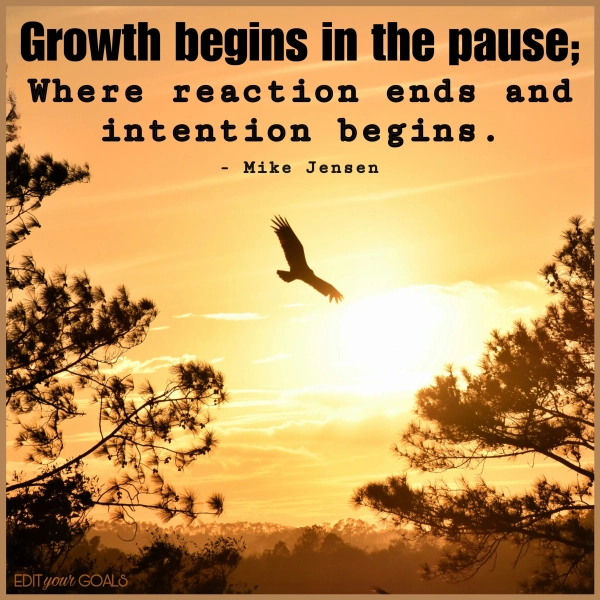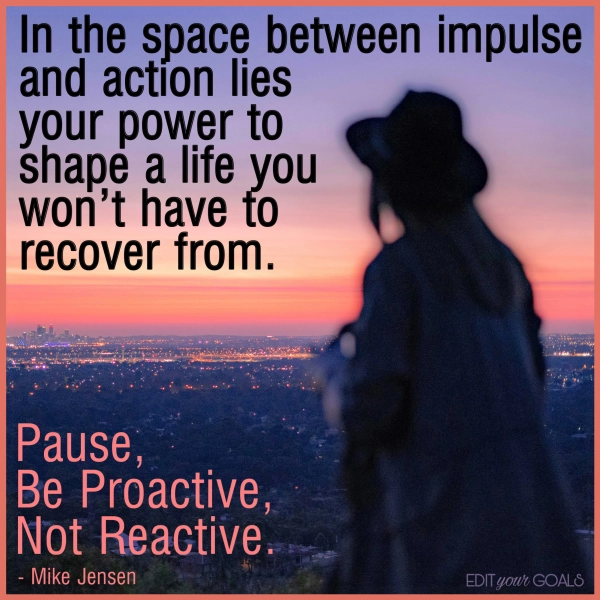Are you becoming how you act?
Imagine a fox or a hawk—they don’t get to choose how they behave. A fox is sneaky because that’s how it survives. A hawk hunts because it was built to. They act on instinct. Humans, however, have the gift of self-awareness. Still, many of us live on autopilot, reacting to life like animals do—quick to anger, jealousy, or deceit—without ever stopping to ask if those reactions serve us.
When we react without thinking, we stay stuck in a primitive state, ruled by emotions and old habits. Anger punishes us by making us feel tense and miserable. Envy weighs us down with dissatisfaction. Deceit isolates us because it erodes trust. These reactions don’t help us—they hurt us. And while we can’t instantly change who we are, we can influence the person we’re becoming.
That power lies in the pause. The moment between stimulus and response is where our growth happens. If someone insults us, we can pause, take a breath, and choose how to respond. Instead of anger, we might choose calm. Instead of envy, we might choose gratitude. Instead of deceit, we might choose honesty. Every pause is a chance to shift from a reactive life to a proactive one.
When we choose our energy intentionally, we begin to live with purpose instead of impulse. That’s how we step out of survival mode and into our potential—by using our influence to shape our identity, one moment at a time.
If this reached you or there was something that truly resonated with you, please like and share in hopes this will maybe reach someone that it could help.
-Coach Mike
EDIT your GOALS
Every
Day
Internal
Thoughts
Guarantees
Our
Absolute
Life
Situations
#growth #pause #reaction #intention #potential
Background Picture by
Sam Bark
Imagine a fox or a hawk—they don’t get to choose how they behave. A fox is sneaky because that’s how it survives. A hawk hunts because it was built to. They act on instinct. Humans, however, have the gift of self-awareness. Still, many of us live on autopilot, reacting to life like animals do—quick to anger, jealousy, or deceit—without ever stopping to ask if those reactions serve us.
When we react without thinking, we stay stuck in a primitive state, ruled by emotions and old habits. Anger punishes us by making us feel tense and miserable. Envy weighs us down with dissatisfaction. Deceit isolates us because it erodes trust. These reactions don’t help us—they hurt us. And while we can’t instantly change who we are, we can influence the person we’re becoming.
That power lies in the pause. The moment between stimulus and response is where our growth happens. If someone insults us, we can pause, take a breath, and choose how to respond. Instead of anger, we might choose calm. Instead of envy, we might choose gratitude. Instead of deceit, we might choose honesty. Every pause is a chance to shift from a reactive life to a proactive one.
When we choose our energy intentionally, we begin to live with purpose instead of impulse. That’s how we step out of survival mode and into our potential—by using our influence to shape our identity, one moment at a time.
If this reached you or there was something that truly resonated with you, please like and share in hopes this will maybe reach someone that it could help.
-Coach Mike
EDIT your GOALS
Every
Day
Internal
Thoughts
Guarantees
Our
Absolute
Life
Situations
#growth #pause #reaction #intention #potential
Background Picture by
Sam Bark
Do we really want the consequences?
Many people believe they are surprised by the outcomes of their choices, but in truth, they often know the consequences—they simply underestimate how deeply those consequences will affect them. This mindset is particularly dangerous when paired with reactive behavior. When we react impulsively, without thinking, we make choices based on emotion or habit, not wisdom. We tell ourselves it’s no big deal or that we’ll handle whatever happens later. But later always comes, and often with more weight than we expected. Emotional outbursts, poor financial decisions, damaged relationships—these are just a few examples of reactive behavior leaving a lasting imprint.
Living reactively drains our energy, yes, but more importantly, it shapes a life full of unintended detours. What begins as a small decision can snowball into long-term consequences we’re forced to live with, not because we were unaware, but because we believed we could bear the outcome more easily than we actually can.
Being proactive changes that. It creates a pause—a space between stimulus and response—where we can reflect, evaluate, and choose. Proactivity isn’t about perfection; it’s about intentionality. It’s about honoring the life we truly want by choosing actions that align with it, rather than reacting to life’s chaos on autopilot. In that space, we reclaim our power. We stop deceiving ourselves and start living with clarity and purpose. And that’s the difference between a life of regret and a life of fulfillment.
If this reached you or there was something that truly resonated with you, please like and share in hopes this will maybe reach someone that it could help.
-Coach Mike
EDIT your GOALS
Every
Day
Internal
Thoughts
Guarantees
Our
Absolute
Life
Situations
#impluse #action #pause #reactive #proactive
Background Picture by
Hc Digital
Many people believe they are surprised by the outcomes of their choices, but in truth, they often know the consequences—they simply underestimate how deeply those consequences will affect them. This mindset is particularly dangerous when paired with reactive behavior. When we react impulsively, without thinking, we make choices based on emotion or habit, not wisdom. We tell ourselves it’s no big deal or that we’ll handle whatever happens later. But later always comes, and often with more weight than we expected. Emotional outbursts, poor financial decisions, damaged relationships—these are just a few examples of reactive behavior leaving a lasting imprint.
Living reactively drains our energy, yes, but more importantly, it shapes a life full of unintended detours. What begins as a small decision can snowball into long-term consequences we’re forced to live with, not because we were unaware, but because we believed we could bear the outcome more easily than we actually can.
Being proactive changes that. It creates a pause—a space between stimulus and response—where we can reflect, evaluate, and choose. Proactivity isn’t about perfection; it’s about intentionality. It’s about honoring the life we truly want by choosing actions that align with it, rather than reacting to life’s chaos on autopilot. In that space, we reclaim our power. We stop deceiving ourselves and start living with clarity and purpose. And that’s the difference between a life of regret and a life of fulfillment.
If this reached you or there was something that truly resonated with you, please like and share in hopes this will maybe reach someone that it could help.
-Coach Mike
EDIT your GOALS
Every
Day
Internal
Thoughts
Guarantees
Our
Absolute
Life
Situations
#impluse #action #pause #reactive #proactive
Background Picture by
Hc Digital
0 mlx
0payments
0posts
0reactions
0tags
0comments
0subscriptions
0new users
0marketplace

